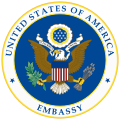| Embassy of the United States to the Holy See | |
|---|---|
 | |
 | |
| Location | Via Sallustiana, 49 |
| Coordinates | 41°54′24″N12°29′31″E / 41.9066051°N 12.4918327°E |
| Opened | 1994 |
| Ambassador | Brian Burch |
| Website | Official website |
The Embassy of the United States of America to the Holy See (Latin : Legatio ad Sanctam Sedem Civitatum Foederatarum Americae) or Embassy Vatican for short, is the diplomatic mission of United States of America to the Holy See, a term referring to the central government and universal reach of the Roman Catholic Church.
Contents
The current embassy moved to new headquarters in September 2015 in a separate building on the same compound as the United States Embassy Rome. [1] The embassy was previously located on Aventine Hill in the Villa Domiziana in Rome, Italy, which was built as a private residence in 1953. In 1994, the U.S. government acquired the property as the new chancery for embassy. [2] On August 2nd 2025, Brian Burch, cofounder of the organization CatholicVote.org, was confirmed by the United States Senate by a vote of 49-44 to be the next ambassador to the Holy See. [3]
The embassy is a part of the "Tri-Mission Community" in Rome, the other two being the Embassy of the United States, Rome and the United States Mission to the U.N. Agencies in Rome.
